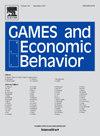模棱两可的说服:事前提法
IF 1
3区 经济学
Q3 ECONOMICS
引用次数: 0
摘要
考虑一个说服博弈,其中发送方和接收方都是歧义厌恶者,具有最大期望效用(MEU)偏好,发送方可以选择歧义信息结构。本文以事前博弈的形式对该博弈进行了分析,即发送方首先承诺一个信息结构,然后接收者通过事前选择一个消息-偶然行动计划来做出最佳响应。在这个公式下,我表明,与标准的无歧义信息结构相比,使用歧义信息结构对发送者来说从来都不是严格有益的。该结果对于(i)玩家对状态有异质信念,和/或(ii)接收者具有非meu,不确定性厌恶偏好是稳健的。然而,对于具有非meu偏好的发送者来说,它不是健壮的。本文章由计算机程序翻译,如有差异,请以英文原文为准。
Ambiguous persuasion: An ex-ante formulation
Consider a persuasion game where both the sender and receiver are ambiguity averse with maxmin expected utility (MEU) preferences and the sender can choose an ambiguous information structure. This paper analyzes the game in an ex-ante formulation: the sender first commits to an information structure, and then the receiver best responds by choosing an ex-ante message-contingent action plan. Under this formulation, I show it is never strictly beneficial for the sender to use an ambiguous information structure as opposed to a standard unambiguous one. This result is robust to (i) the players having heterogeneous beliefs over the states, and/or (ii) the receiver having non-MEU, uncertainty-averse preferences. However, it is not robust to the sender having non-MEU preferences.
求助全文
通过发布文献求助,成功后即可免费获取论文全文。
去求助
来源期刊

Games and Economic Behavior
ECONOMICS-
CiteScore
1.90
自引率
9.10%
发文量
148
期刊介绍:
Games and Economic Behavior facilitates cross-fertilization between theories and applications of game theoretic reasoning. It consistently attracts the best quality and most creative papers in interdisciplinary studies within the social, biological, and mathematical sciences. Most readers recognize it as the leading journal in game theory. Research Areas Include: • Game theory • Economics • Political science • Biology • Computer science • Mathematics • Psychology
 求助内容:
求助内容: 应助结果提醒方式:
应助结果提醒方式:


